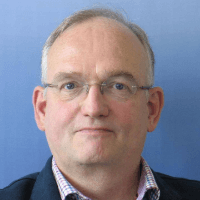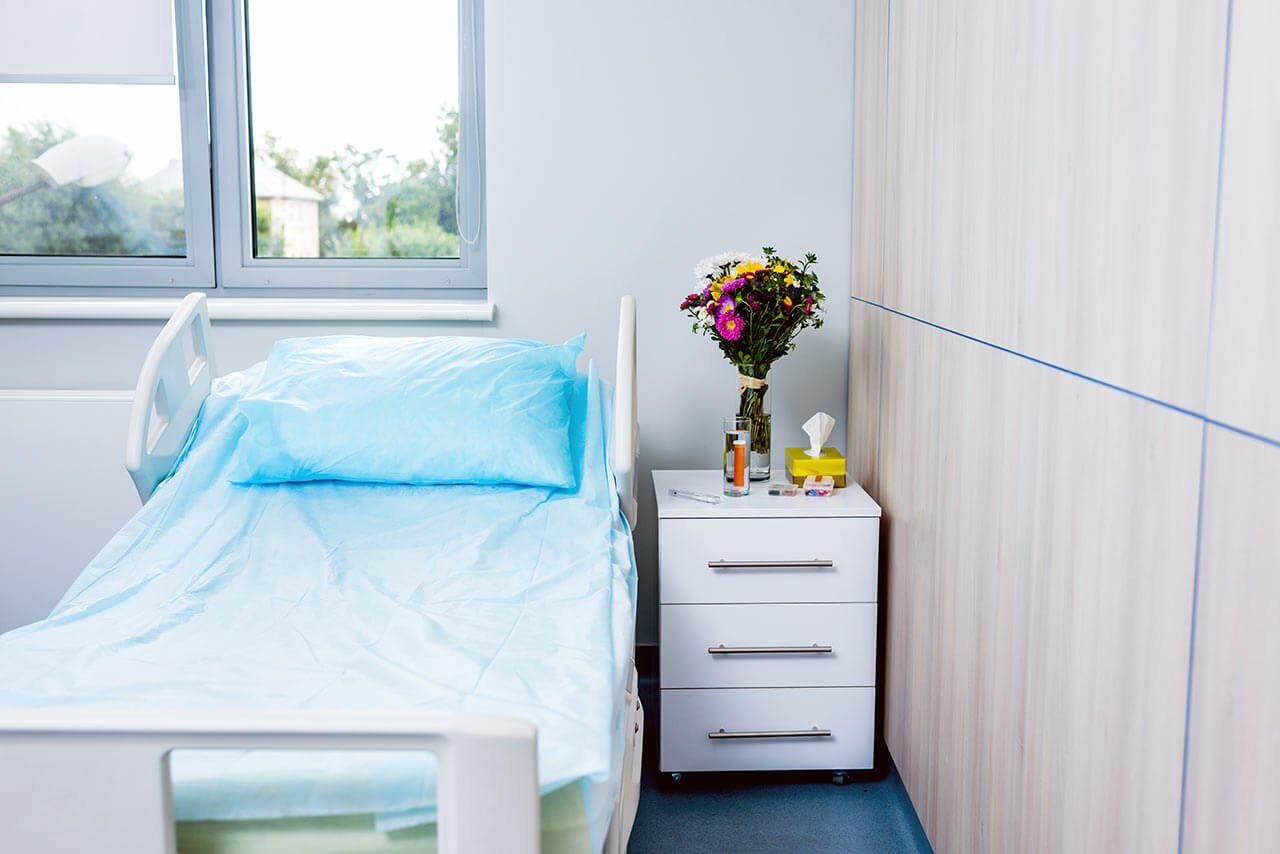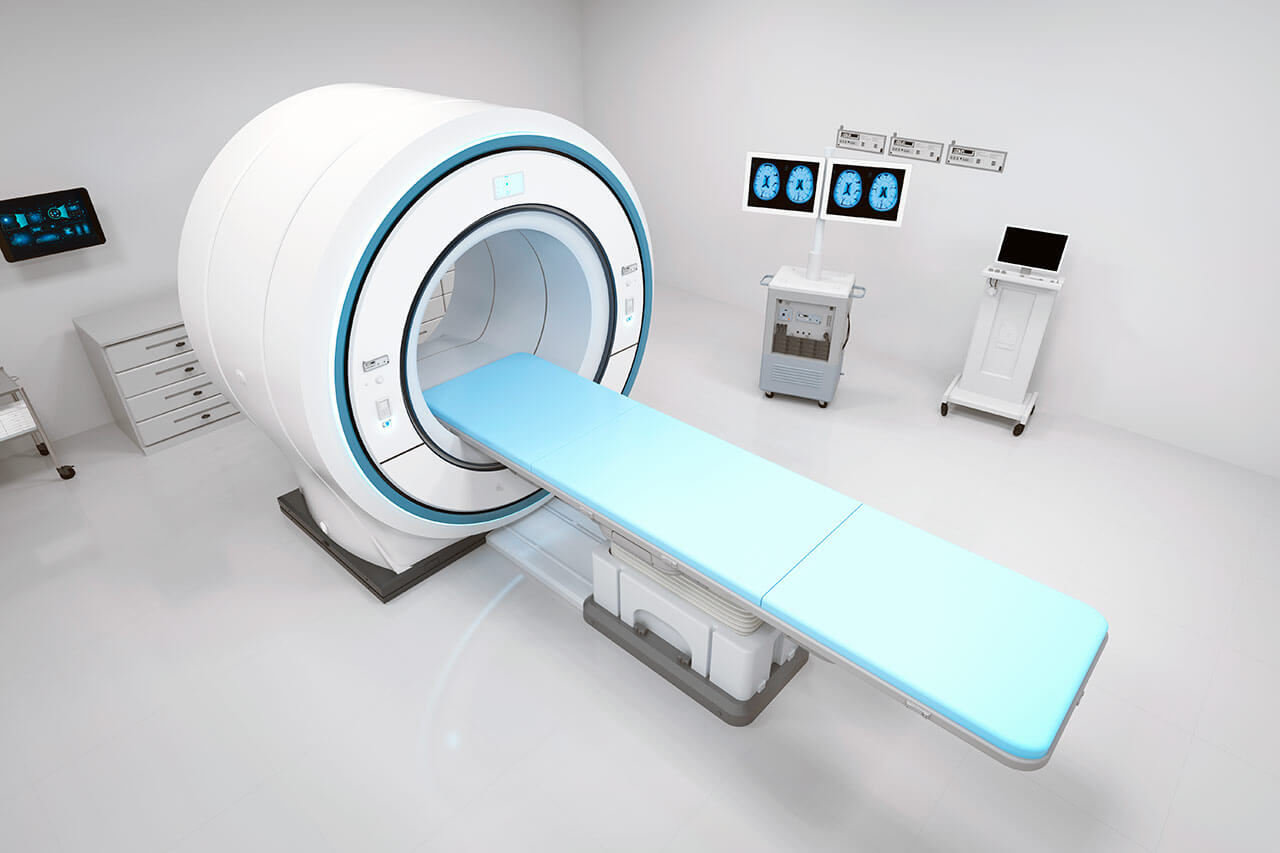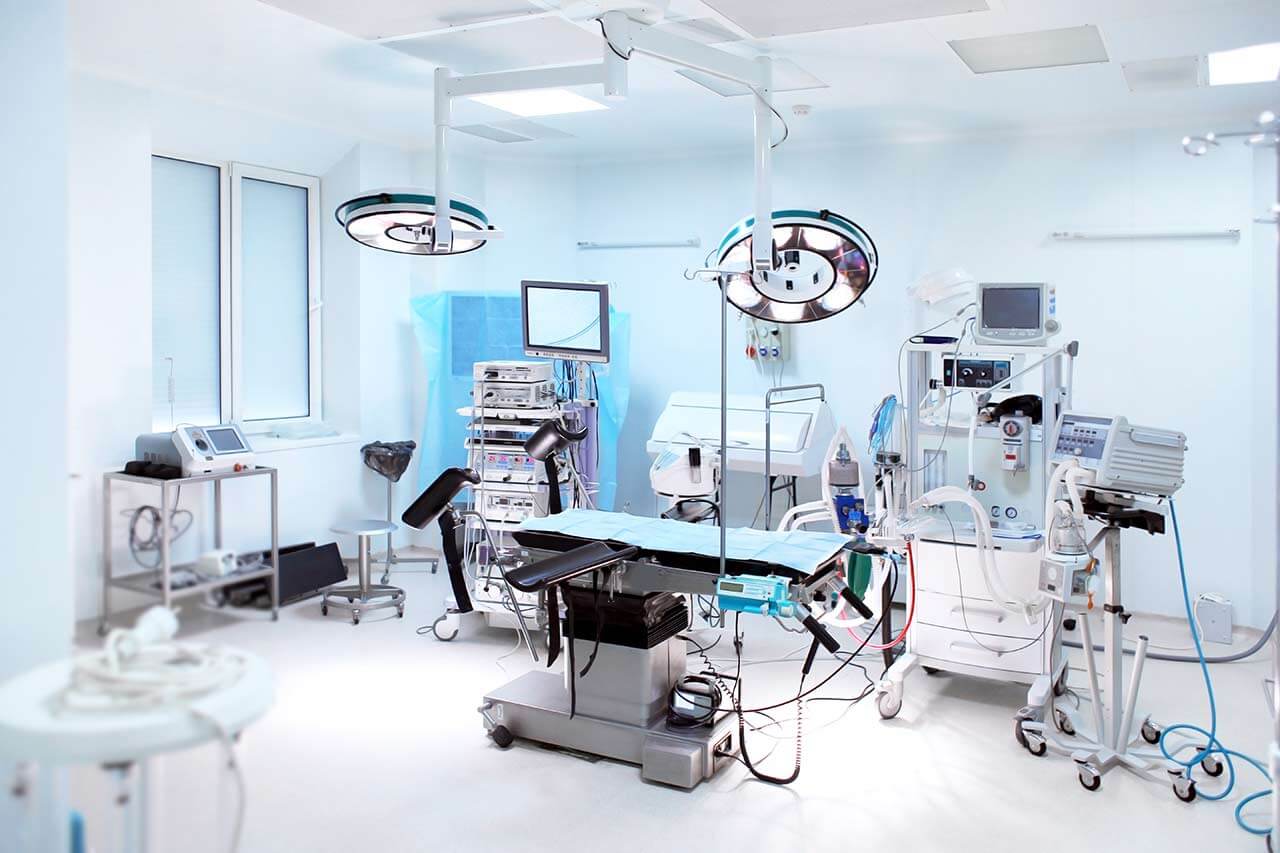
The program includes:
- Initial presentation in the clinic
- clinical history taking
- review of medical records
- physical examination
- laboratory tests:
- complete blood count
- general urine analysis
- biochemical analysis of blood
- inflammation indicators (CRP, ESR)
- indicators blood coagulation
- tumor marker
- planning of proton therapy
- a full course of proton therapy
- symptomatic treatment
- the cost of essential medicines and materials
- nursing services
- control examinations
- consultation of related specialists
How program is carried out
Proton therapy is the outpatient procedure, you do not need to stay in the hospital all the time.
During the first visit, the physician will conduct a clinical examination, go through the available medical records and CT scans. If necessary, the physician will prescribe you additional examinations in order to clarify the diagnosis and determine the localization of the tumor more accurately.
Preparation for proton therapy begins with manufacturing the special device – the individual immobilizer that will fix the position of your body during a proton therapy session. Immobility is essential for high irradiation accuracy.
After the control computed tomography, during which you will stay in the immobilizer, the healthcare professionals will develop an individual treatment scheme. The treatment scheme determines the number of proton therapy sessions, the radiation dose, the angle of the rays and the depth of their penetration. In accordance with these, technical devices are manufactured that determine the depth and form of irradiation. These are the collimator (determines the shape of the proton beam) and the bolus (determines the depth of the proton beam penetration).
After that, a trial irradiation session is carried out using the individual immobilizer, collimator and bolus. Doctors evaluate the radiation dose received by the tumor and its compliance with the treatment scheme.
Proton therapy. The procedures are carried out once a day, 5 days a week. Usually Saturday and Sunday are your free days when you do not need to visit the hospital.
Before each procedure, specialists check the position of your body using X-ray in two projections. If necessary, the irradiation is synchronized with the respiratory movements. After that, the tumor is exposed to the proton beams for 1-3 minutes. The total duration of the session with all the checking procedures is 15-30 minutes.
The procedure is painless and is performed in open-type devices (this is important for overweight people or people with claustrophobia). Proton therapy does not require bed rest or other restrictions of physical activity.
Monitoring the treatment effectiveness. After completing the treatment, you will be advised to come in for the long-term follow-up. You will visit your doctor regularly for a clinical examination and, if necessary, a CT scan.
Required documents
- Medical records
- MRI/CT scan (not older than 3 months)
- Biopsy results (if available)
Service
You may also book:
 BookingHealth Price from:
BookingHealth Price from:
About the department
The Proton Therapy Center specializes in an innovative type of radiation therapy for children, namely proton therapy. The medical facility is one of four centers in Germany offering proton therapy for cancer treatment in young patients. The center has been working since October 2015 in close cooperation with the Marburg Ion Beam Therapy Center and today can boast exceptional clinical experience in the field of its competence. Proton therapy is significantly superior to conventional radiation therapy in terms of dose control, dose distribution and side effect profile. Thus, it is an excellent alternative form of cancer treatment. The main advantage of proton therapy is that it has potentially fewer immediate and long-term side effects as compared to classical radiation therapy. The harmful effects on healthy tissues during proton therapy are minimized, which is especially important for children, as their brain and body are in the growth phase. In addition, proton therapy is provided on an outpatient basis and is an absolutely painless treatment, which is also important for young patients. The Center is headed by Prof. Dr. Dieter Körholz.
The first stage of treatment is a consultation with a specialist at the center, who, after a preliminary study of the patient's medical history and the latest diagnostic data, provides the patient and his family with detailed information about proton therapy, its effectiveness and possible side effects. The next stage of the therapeutic process is the preparation of the patient for irradiation, which is carried out using CT planning. Proton therapy is characterized by high precision, which is achieved due to the individual preparation of each patient – an accurate development of the irradiation regimen and the manufacture of an immobilizer to prevent the child's body from moving and displacement of the radiation area during the procedure. The young patient then undergoes CT scanning with a ready-made immobilizer. It allows the doctor to calculate the angle, depth and dose of radiation, the optimal number of proton therapy sessions and other important parameters. With an individually tailored treatment regimen, the specialists of the center proceed to proton therapy.
During the procedure, the pathological focus is irradiated with proton beams, which release the bulk of their energy at the area of localization of the malignancy. As they move through the body, protons slow down, interact with electrons and emit maximum radiation at the end of their path, which practically excludes a negative effect on the healthy tissues of the human body. The place where the most energy is released is called the Bragg peak. The availability of modern technology allows the doctors of the medical center to calculate the Bragg peak in the child's body so that it coincides with the center of cancer. The use of proton therapy allows the doctors to guarantee the minimum long-term side effects on the child's body. The treatment is outpatient, while the radiation session takes only a few minutes. Proton therapy is completely painless, so the child does not experience any fear and the associated emotional shock, for example, as before the forthcoming surgery or chemotherapy. In most cases, the duration of the treatment course is 3-6 weeks. After proton therapy, the child should have regular follow-up examinations to assess his overall health and prevent recurrence.
Proton therapy has proven to be highly effective in the treatment of such cancers in children as ependymoma, retinoblastoma, medulloblastoma, glioma, lymphoma, sarcoma, neuroblastoma, craniopharyngioma, germ cell tumors and others. Since proton therapy does not require any interventional manipulation, it is an ideal option for the treatment of inoperable tumors located in hard-to-reach areas. In addition, the highest precision of proton therapy combined with the most sparing effect on the healthy organs and adjacent tissues avoids damage to vital organs, such as the brain, heart, lungs, kidneys and liver.
It should be noted that the doctors of the center have vast clinical experience and excellent professional skills, thanks to which they have saved the lives of thousands of young patients with severe cancers. The specialists devote enough time to communication with the parents of young patients and with the children themselves, since they understand that the fight against oncology is a complex challenge for both the child and his family.
The Proton Therapy Center specializes in the treatment of the following malignant diseases in children and adolescents:
- Ependymomas
- Retinoblastomas
- Medulloblastomas
- Gliomas
- Lymphomas
- Soft tissue sarcomas
- Neuroblastomas
- Germ cell tumors
- Craniopharyngiomas
- Other oncological diseases in children
Curriculum vitae
- 1984 Admission to medical practice.
- 1992 Board certification in Pediatrics.
- 1994 Position of Senior Physician.
- 1998 Deputy Head of the Department of Pediatric Hematology and Oncology.
- 1999 C3 Professor in Pediatric Hematology and Oncology, University of Leipzig.
- 2006 W3 Professor and Head of the Department of Pediatric and Adolescent Medicine, University Hospital Halle-Wittenberg.
Photo of the doctor: (c) UKGM – Universitätsklinikum Gießen und Marburg GmbH
About hospital
The University Hospital Giessen UKGM positions itself as an ultramodern medical facility with outstanding quality of medical care. The hospital presents almost all areas of medicine, ranging from ophthalmology to traumatology and dentistry. The priorities of the hospital’s activities include surgery, neurosurgery, oncology, nephrology with kidney transplantation and pediatric medicine.
The hospital is the third largest in Germany. Every year, more than 436,000 patients are treated in two locations of the hospital (Giessen and Marburg): 342,000 outpatients and 94,000 inpatients. The medical facility is the first privatized university hospital in the country.
The hospital staff is engaged not only in clinical practice, but also in research activities on the basis of the Faculty of Medicine at Justus Liebig University Giessen and Philipps University of Marburg, which contributes to a significant contribution to the development of modern medicine. During the many years of productive work on the development of new diagnostic and treatment methods, the hospital’s doctors managed to make many significant discoveries.
The hospital enjoys an excellent reputation in Germany and far beyond its borders. It managed to gain such credibility thanks to the high competence of doctors, advanced equipment, high-quality medical service and care.
Photo: (c) depositphotos
Accommodation in hospital
Patients rooms
The patients of the University Hospital Giessen UKGM live in comfortable rooms made in a modern design and light colors. Each room has an ensuite bathroom with shower and toilet. The standard room furnishing includes an automatically adjustable bed, a bedside table, a wardrobe, a table and chairs for receiving visitors, a TV, a telephone.
Meals and Menus
The patients of the hospital are offered balanced, healthy three meals a day: buffet breakfast, lunch and dinner. The private kitchen, certified according to DIN EN ISO 9001:2000, is responsible for providing patients with food and drinks.
If for some reason you do not eat all foods, you will be offered an individual menu. The hospital also has a cafeteria with a large assortment of hot and cold drinks, snacks and desserts.
Further details
Standard rooms include:
Television
All patient rooms are equipped with TV sets. If you have some questions, please contact medical personnel.
Religion
Religious services can be provided upon request.
Accompanying person
During an inpatient program, an accompanying person can stay with you in a patient room or in a hotel of your choice.
Hotel
During the outpatient program, you can stay at the hotel of your choice. Our managers will help you to choose the most suitable option.




